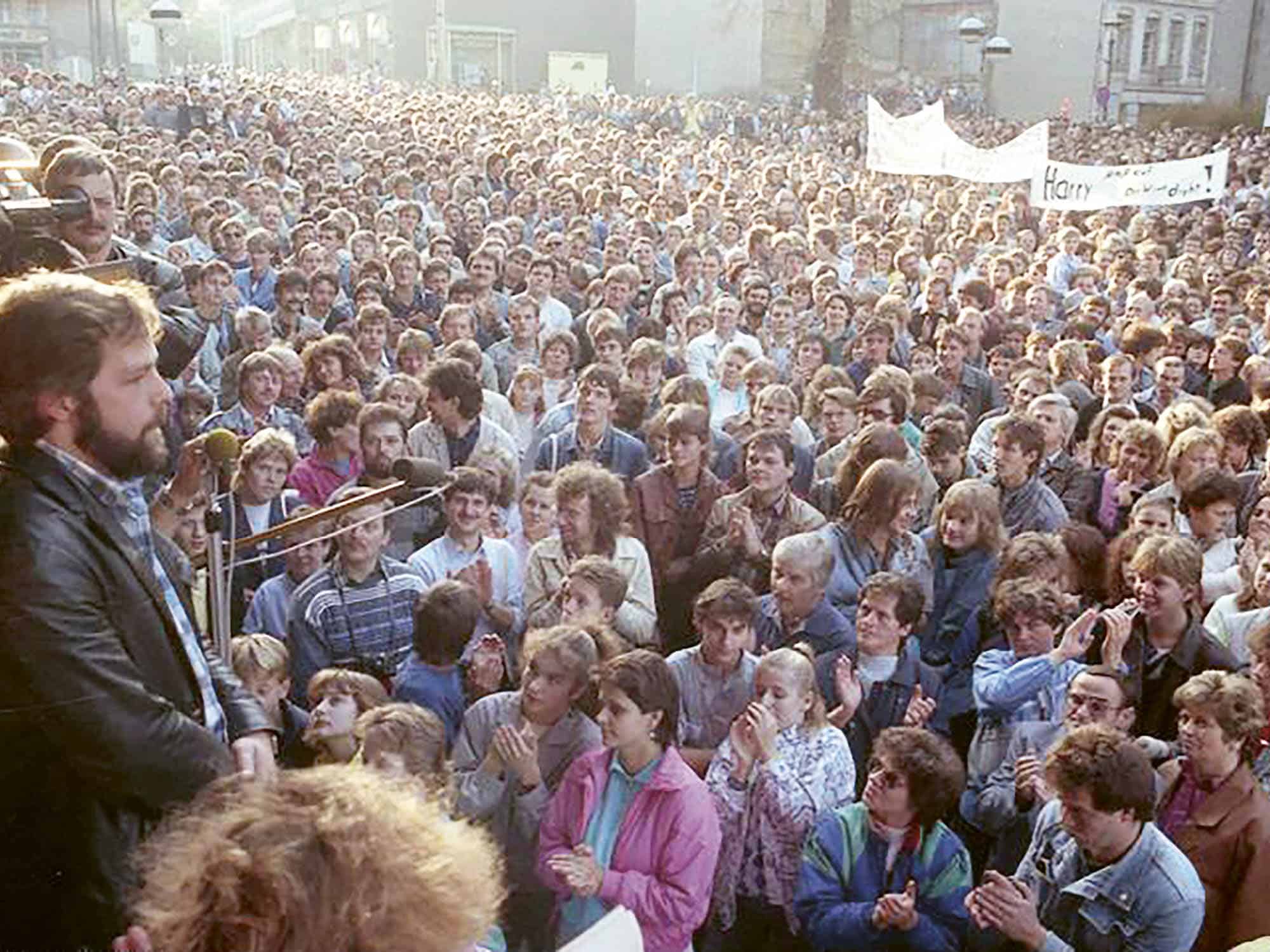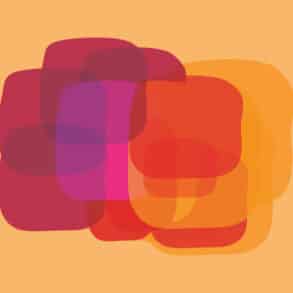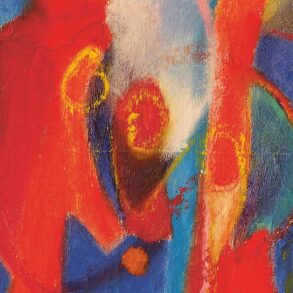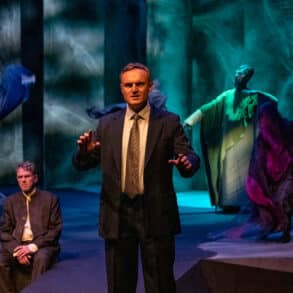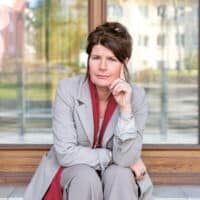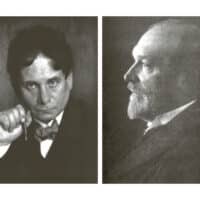Gerald Häfner with perspectives on the democratic crisis in Germany. Interview by Wolfgang Held.
Wolfgang Held: What did you think of the election results in Thuringia, Saxony, and Brandenburg?1
Gerald Häfner: I saw them as a reflection of a dramatic development that needs to be understood. On a personal level, they were very concerning. It’s worrying to see the kinds of thinking, speaking, and behaving that more and more people are supporting. When more and more people give voice to powers that barely understand any kind of differentiation or factual arguments, when they no longer make judgments about an individual’s behavior in a certain situation but rather about whole groups and collectives, then this tells me something has dramatically changed in Germany. The mood’s become aggressive, hostile, and gloomy. Public discourse is opening to a dangerous group-think. The “other side” is seen in such a negative light that all feelings of humanity recede. Intolerance is on the rise. This scares me.
Is this a kind of new type of phenomenon?
More like a relapse. In my youth, I still heard: “It wouldn’t have happened under Hitler!” or “Someone like you should be gassed!”—probably, because of my long hair. I considered this mood of threats as a remnant of a previous dark time. I was confident it would soon be left behind. And, in fact, we did become more civilized; we learned to be open-minded and interested in each other, even to listen more and question our own points of view. It’s always a remarkable thing in history when something seems to regress. When something returns that’s already reared its ugly head and manifested all its terrible consequences, it’s twice as scary. We see this everywhere, even outside Europe.
This is probably the fear of losing one’s middle-class life. What causes indignation today?
There are many reasons. The structural change in the public sphere is one. With this: the filter bubble, the programmed rewarding of extremes, the abyss between worldviews, the loss of trust, the disappearance of conversation. Perhaps, even more serious is fear. Anyone who radically questions the status quo reaps indignation, anger, and defensiveness. Today, it’s not a rebellious generation that’s doing all this, but life, politics, and the economy itself. The world has become unsettling, indeed threatening. This leads to insecurity among an ever-increasing proportion of the population.
You’ve been committed to direct democracy for decades. Did you ever expect these sorts of problems?
I began my commitment out of the idea that we, as humanity, are faced with the task of completely redefining our societal approach to each other—and that this can only be done together, i.e., freely, through the power of the individual and insight, meaning, democratically—either that or the world will become cold and authoritarian. The current situation shows what happens when this necessary societal reorganization does not take place. It’s in our hands. Here’s a couple of statistics: in East Germany, 55 percent are very or mostly dissatisfied with democracy; in West Germany, 44 percent. In the West, 69 percent feel marginalized and patronized by politics; in the East, 71 percent. This shows that people don’t feel they’re being heard or listened to. Rather, they have the feeling that all these frightening developments are simply steamrolling them: they’re at their mercy. In East Germany, there has long been a fundamental feeling of not being counted, of being ripped off, and we have to take that seriously. Among other things, this has to do with a serious mistake made by the Kohl government2 on the path to German unification: the violation of the mandate of the Basic Law, which called for a “constitution freely adopted by the German people.”3
That’s in the Basic Law?
Yes, in the final provision, Article 146. When the Basic Law was created, Germany was divided. The intention was not to create unalterable facts but rather to keep the path to unification open and only then adopt a constitution. A constitution could only be adopted after unification and freedom had been achieved, not while some Germans were still denied the opportunity to participate. Accordingly, at the beginning of the Basic Law, it said: “. . . to give a new order to political life for a transitional period” (Preamble to the original draft of Basic Law of May 23, 1949).4
At the end: “This Basic Law . . . shall cease to apply on the day on which a constitution freely adopted by the German people takes effect” (Art. 146). It was clear that when reunification became possible, a collaborative process for a new German constitution to be adopted by the people would begin. That’s why this text has thus never been called a “constitution” but rather a “Basic Law.” Incidentally, I discovered this when I was still at school because back then, I read the twelve volumes of Sämtliche Protokolle des Parlamentarischen Rates [Collected Minutes of the Parliamentary Council] in our public library like it was a thriller novel.
Were you interested in these questions as a student?
Yes, isn’t it fascinating?! How do you found a state anew, upon a field of rubble? What ideas did they have? This openness, this courage, this is what we lack today! For example, Germany could’ve been a little more Swiss (as surveys at the time showed). In both East and West, the vast majority were in favor of referendums. But, the majority in the West feared any kind of debate, especially some kind of substantial change. I was in the Bundestag [Federal Parliament] at the time, and I was able to present my proposals as a constitutional expert in all the new federal state parliaments. When I realized that no one dared to oppose Kohl, and so we would be unsuccessful on the official track, I founded an initiative for a new constitution with a referendum together with some of the most interesting minds in both parts of Germany, which was supported by 1.7 million citizens. That was a great piece of work—the first all-German citizens’ initiative.
Presumably, not to the delight of the government at the time?
No, they put up massive resistance. Meanwhile, they’d discovered a way to circumvent the constitutional mandate of the Basic Law: via Article 23 of the Basic Law, which regulated the accession of further states. This was made possible by Helmut Kohl as Federal Chancellor in order to achieve the accession of the GDR [German Democratic Republic of East Germany] without a constitution and without a referendum. Many, including Hildegard Hamm-Brücher, Günther Gaus, and Fritz Pleitgen, for example, joined our initiative with the motto: “Article 23—No annexation under this number,” and the demand for a new constitution by the whole of Germany [East and West]. We even wrote a “draft constitution from below.” It was very close! Our proposal even found a majority in the Joint Constitutional Commission [Gemeinsamen Verfassungskommission] of the federation [Bund] and the federated states [Ländern]. But the whole thing failed because of the CDU [Christian Democratic Union of Germany] and FDP [Free Democratic Party] majority in the Bundestag.
What were the consequences?
Serious consequences, in my opinion, to this day. Because unification created an affront that’s difficult for the West to understand. It makes a difference whether we meet as equals, shake hands, determine the foundations for this new thing together—or, whether the West just says: Everything you’ve experienced, thought, done, and developed thus far was wrong. We’re throwing it out—not interested. But, everything we think and do was and is right. We don’t question it, not one iota. From now on, you have to learn everything from the ground up and from us. So, get to the back of the line and learn how to think, speak, and act. From now on, there’s only our law, our culture, our economy. It was a massive insult. Their own lives, their own life experience, everything they suffered and created counts for nothing. Everything from the West was valid, even if it was bad, problematic, outdated, or in need of change. And so, people were plunged from one dictatorship to the next. After fascism came state socialism. To this day, they lack the fundamental experience of being able to substantially shape and determine their society themselves. Instead, many people once again have the feeling that other, distant elites are determining policy over their heads. So, they draw attention to themselves—offended, hurt, angry rather than calm, self-determined, and sovereign. What do we expect?
A rift runs through the country.
Yes, there’s little understanding or willingness to heal. Instead, East Germany’s diagnosed with a “dangerous shift to the right” and a “deficit of democracy.” They condemn—and thereby reinforce—the feeling of not being understood.
What is there to do?
Participatory and, above all, direct democracy would be a healing instrument because it enables discourse and shows the effective power of the individual. Referendums are about factual issues that are clarified through discussion. Not about parties and power.
Steffen Mau writes in Ungleich vereint: Warum der Osten anders bleibt [Unequally united: Why the East remains different]5 that the narrative prevails in West Germany that East Germany has no identity of its own, that it’s only the “new federal states.” Mau argues that this is frustrating because each region ought to form its own identity.
Indeed, there’s an enormous richness and diversity which is not given enough attention. The West tends to judge by the wrong standards, namely, its own. For example, many East Germans learned Russian at school and are more willing to understand the developments going on in Russia. In the West, we grew up with English and with the US as our guiding culture; our views are often strongly—often unconsciously—influenced by America. There is a complete unwillingness here to engage with the other side, to listen, and to understand. We would be well advised to ask: What’s important for you? What are your concerns? Perhaps, Germany will break new ground as soon as we begin to meet each other—like all problems in the world—with an open heart and an awake reason.
In Switzerland, right-wing nationalist positions remain part of the discourse. Is Switzerland doing anything better?
Some things. Switzerland practices direct democracy. This means that people regularly decide how they want to deal with drinking water, energy, or immigration, for example, regardless of political party divisions. Nowhere is the experience of a positive identity as strong as in Switzerland, despite the different languages. Different languages are also spoken in Belgium. But their country is deeply divided, politically, too. There is hardly any solidarity across these barriers. In Switzerland, discussions are held regularly across all language and party boundaries that result in referendums. This strengthens an identity beyond the local identities of distinct valley or mountain regions. Along with this is the Swiss concordance system. Every relevant political force is involved in the government. Without this, when a government and an opposition face off against each other, then one makes decisions, and the other opposes. That system is geared towards competition, confrontation, and sometimes even destruction. Switzerland, on the other hand, is oriented towards cooperation and collaboration. All voices are at the table, and all seek agreement.
Where do you see encouraging signs?
In civil society. In other words, below the political level, new collaborative skills are emerging—also, in the professional sphere: Many people are already working in a flexible, cooperative, and co-creative way. A new culture of business meetings is emerging where everyone can contribute constructively. My feeling is that society is already much further ahead than politics. That shocks me: the divergence between what human beings are inwardly striving for and how our community is organized.
Why do those in leading positions, who themselves have a grassroots democratic attitude, still find it difficult to go along with these new developments?
Being a minister, state secretary, or even a member of parliament is an enormously heavy burden. In today’s complex society, it’s impossible to please everyone and one is constantly exposed to pressure, criticism, a feeling of being overwhelmed, and aggression. It’s difficult to keep an open mind. Many people follow strategies and spin everything to cover up their responsibility. In this way, they close themselves off. That’s one of the reasons why I never stayed in a parliament for more than four years. I always alternated between working in parliament and working in civil society. I gave my all for four years—and then got out of this world of its own and into real life. Otherwise, I might’ve turned out differently than I would’ve liked. The cost was that I no longer have a say in decisions. I felt that during the pandemic and the war in Ukraine. Even among my political friends, I could hardly find anyone who had the courage to think and act differently than was usual in the Berlin power centers at the time. With the burden of office, it becomes more difficult to maintain an inner standard and retain independence of thought and judgment.
How can the political culture become healthier?
I would start with something East German: round tables! They developed all over there in 1989 and 1990.6 People came together from a wide range of ideological backgrounds in order to find collaborative solutions to the problems at hand. And that is a very healthy, very natural, and I would also say a very progressive approach to solving problems. Round tables also include the idea of bringing in people who have special expertise or can help depending on the topic and problem. A round table holds a conversation where very different ways of thinking can live together, along with a collaborative willingness to listen to each other, learn from each other, and come to joint decisions.
The first round table emerged from the big demonstration in Leipzig. There were People’s Police everywhere. The NVA [Nationale Volksarmee, National People’s Army] had set up camps with barbed wire to contain the masses of arrested demonstrators. You could feel the fear; people were shouting: “No violence!” Talks then began between the German People’s Police and representatives of the demonstrators. An initial nucleus was formed, the “Council of 20.” Gradually, a new legitimacy emerged. It was not based on parties and elections but on personal integrity and individual autonomy when approaching each other and on the ability to discuss and solve problems together without violence. This gave rise to a movement that swept through the entire GDR in just a few weeks. Round tables were formed everywhere, including the Center Round Table in East Berlin. Over time, the old cadres had less and less to say. They were replaced by citizens, who sat down together and talked until they found solutions to the issues that arose. It was a great moment for democracy. We could learn a lot from the round tables in East Germany today.
What kinds of questions should be discussed at the round tables?
Everything that affects the community. Take migration. An example from Gauting, Germany, near Munich: citizens got together in the form of a round table and asked themselves, “What can we do so that the locals don’t have to be afraid of refugees and the refugees don’t have to be afraid of the locals?” One result was a cultural evening where the new arrivals talked about their lives and their flight from persecution, and some sang a song from their home countries. This all helped the immigrants to become more human in the eyes of the residents. But, also urban development, public transportation, traffic control—everything can be discussed there. Other suggestions would be citizens’ assemblies and citizens’ councils—all elements of a participatory and direct democracy! Anything that strengthens human beings in their capacity for competency and sovereignty. That would also make up for the failure of 1989, when a needed democratization was thwarted and left behind the most serious grievances. We should approach each other as equals and rectify the perpetuating mistake. How important would it be today to redefine our community! Democracy, climate, wars, the role of money, our education, and medical systems—so many unresolved issues that we stubbornly avoid, reinforcing negative developments and dissatisfaction. We need all human beings and all points of view in order to understand each other and to solve our problems. Above all, human beings need the experience of having a voice and being heard—only then will democracy exist, and only then will self-government in state-political life become possible.
Translation Joshua Kelberman
Image Demonstration in front of the town hall in Plauen on October 30, 1989. Bundesarchiv [Federal archive]. Photo: Wolfgang Thieme, CC BY-SA 3.0 DE
Footnotes
- The election results in Thuringia, Saxony, and Brandenburg (all parts of eastern Germany) were surprisingly farther to the right than in previous years—Trans. Note; for further information see Matthew Karnitschnig, “Scholz survives as his party edges far-right AfD in Brandenburg election,” Politico (September 22, 2024), accessed Oct. 13, 2024; Paul Kirby and Jessica Parker, “German far right hails ‘historic’ election victory in east,” BBC (September 2, 2024), accessed Oct. 13, 2024; Philip Oltermann, “Success of far-right AfD shows east and west Germany are drifting further apart,” The Guardian (September 1, 2024), accessed Oct. 13, 2024.
- Helmut Kohl (1930–2017), German politician. Chancellor of West Germany, 1982–1990 and the reunified German nation, 1990–1998. Presided over the integration of East Germany into West Germany in 1990, becoming the first chancellor of a unified Germany since 1945. Britannica Academic, s.v. “Helmut Kohl,” accessed October 13, 2024—Trans. note.
- Basic Law for the Federal Republic of Germany (May 23, 1949, as amended on Dec. 1, 1993, and Dec. 19, 2022), translated by Professor Christian Tomuschat; see Article 146, “Duration of the Basic Law”—Trans. note.
- Basic Law of the Federal Republic of Germany (May 23, 1949), translator unknown—Trans. note.
- Stephan Mau, Ungleich vereint: Warum der Osten anders bleibt [Unequally united: Why the East remains different], 2nd edn. (Berlin: Suhrkamp, 2024)—Trans. note.
- See, for example, Joachim Gauck, “Speech on democracy by Federal President Joachim Gauck at the ceremony to mark the 25th anniversary of the peaceful revolution,” (October 9, 2014), Der Bundespräsident [The Federal President], accessed Oct. 13, 2024—Trans. note.

